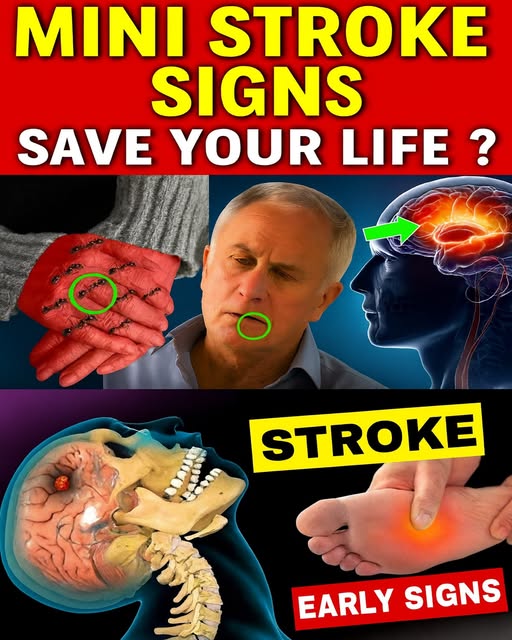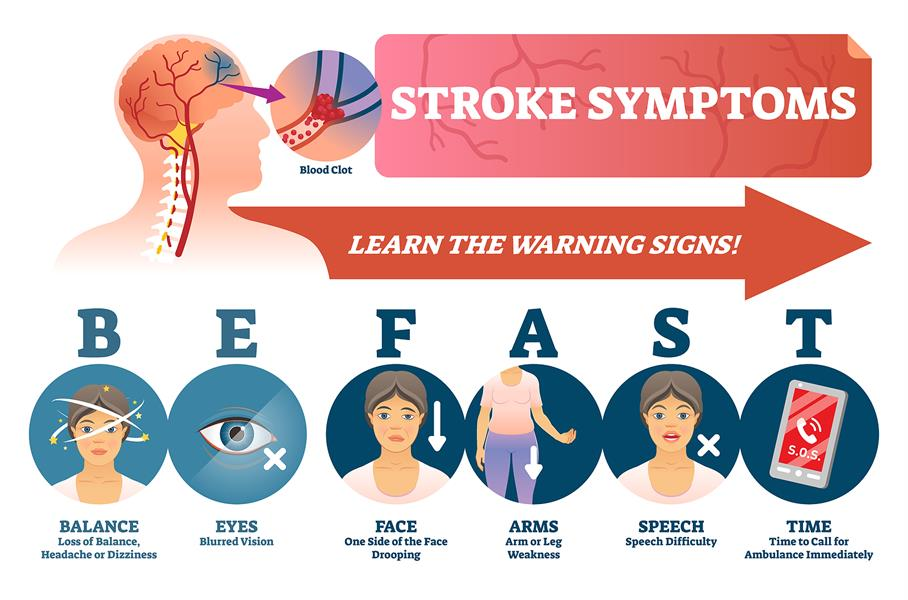Every year, nearly 15 million people worldwide suffer a stroke, and according to the World Health Organization, about 5 million of them do not survive. What’s even more shocking is that strokes are often preceded by subtle warning signs—sometimes appearing as early as a month before the event. Yet, because these signals are so easily mistaken for minor issues like fatigue, stress, or aging, many people ignore them until it’s too late.
Recognizing these early symptoms could make the difference between prevention and permanent damage. Strokes don’t just happen suddenly; in many cases, the body sends signals that something is wrong with blood flow to the brain. In this article, we’ll uncover 10 unbelievable signs that may appear weeks before a stroke, explain why they matter, and show you how to respond. By the end, you’ll have the knowledge to protect yourself and your loved ones—and potentially save a life.

What Is a Stroke and Why Early Detection Matters
A stroke occurs when blood flow to the brain is interrupted or reduced, depriving brain tissue of oxygen and nutrients. Within minutes, brain cells start to die. There are two main types: ischemic strokes (caused by blood clots) and hemorrhagic strokes (caused by bleeding in the brain).
The earlier a stroke is detected, the better the chances of survival and recovery. Medical professionals often refer to the acronym FAST—Face drooping, Arm weakness, Speech difficulties, Time to call emergency services—as the gold standard for stroke response. But before these acute symptoms strike, early signs may develop slowly.
10 Warning Signs of Stroke One Month Before
1. Persistent Headaches
Unusual or severe headaches that don’t respond to medication may indicate restricted blood flow or small clots forming in the brain. These headaches often feel different from normal tension headaches or migraines.

2. Sudden Vision Problems
Blurred vision, double vision, or loss of vision in one eye can occur weeks before a stroke. It may feel like a curtain is falling over your eyes.
3. Dizziness and Loss of Balance
Feeling unusually unsteady, lightheaded, or having trouble walking without explanation could point to early stroke-related brain changes.
4. Frequent Numbness or Tingling
Numbness in the arms, legs, or face that comes and goes—especially on one side of the body—is a red flag for reduced circulation in brain regions controlling sensation.

5. Speech Difficulties
Slurred words, trouble finding the right word, or forgetting simple vocabulary can begin subtly before escalating into full speech impairment.
6. Sudden Fatigue and Weakness
Feeling drained without reason, or experiencing sudden weakness in the arms or legs, may indicate early signs of vascular stress.
7. Trouble Swallowing
Difficulty swallowing food or liquids can be an overlooked pre-stroke symptom, linked to muscle control in the throat.
8. Shortness of Breath and Chest Pain
Since strokes are closely related to cardiovascular health, chest discomfort or labored breathing should never be ignored.

9. Memory Lapses or Confusion
Forgetfulness, difficulty concentrating, or confusion about simple tasks can appear weeks before a major stroke.
10. Sleep Disturbances
Sudden insomnia, frequent waking at night, or unusual snoring patterns may indicate circulation problems linked to stroke risk.
Practical Steps to Reduce Risk
Knowing the signs is only half the battle. Taking preventive action is what saves lives.
- Monitor blood pressure: High blood pressure is the number one risk factor. Check it regularly.
- Eat a balanced diet: Focus on whole grains, fruits, vegetables, lean proteins, and omega-3-rich foods.
- Stay active: Just 30 minutes of walking daily can significantly reduce stroke risk.
- Limit smoking and alcohol: Both damage blood vessels and increase clotting risk.
- Manage stress: Meditation, deep breathing, and yoga can help maintain healthy circulation.
- Get regular check-ups: Annual screenings for cholesterol, diabetes, and heart disease are essential.
Quick Reference Table
| Symptom | Why It Matters | What to Do Immediately |
|---|---|---|
| Persistent headaches | May indicate vascular changes | Consult a doctor if unusual |
| Vision problems | Reduced blood flow to optic nerve | Schedule eye and medical exam |
| Dizziness, imbalance | Possible brain circulation issues | Avoid driving, seek medical care |
| Numbness or tingling | Warning sign of clot formation | Track frequency, see physician |
| Speech difficulties | Early neurological change | Record episodes, get checked |
| Fatigue and weakness | Circulation and oxygen deficit | Rest and consult doctor |
| Trouble swallowing | Muscle control problem | Seek immediate evaluation |
| Chest pain, breath issues | Stroke and heart risk overlap | Emergency check-up needed |
| Memory lapses, confusion | Early brain signal disturbance | Discuss with neurologist |
| Sleep disturbances | Linked to poor circulation | Monitor and adjust lifestyle |

Real-Life Case Study
James, a 62-year-old accountant, began experiencing frequent dizziness and minor speech difficulties a month before his stroke. He dismissed them as signs of stress. Weeks later, he collapsed at work and was rushed to the hospital. Fortunately, he survived, but his recovery took months. Doctors later explained that if he had sought help earlier, the stroke might have been prevented. James’s story is a sobering reminder: don’t ignore the subtle warnings your body gives you.
Conclusion
Strokes rarely come without warning. Subtle symptoms like persistent headaches, vision changes, dizziness, numbness, and speech difficulties may appear weeks in advance. Recognizing and acting on these signals can make the difference between prevention, survival, and irreversible damage. The key is not to dismiss these signs as minor inconveniences—your body may be sending urgent messages.
Frequently Asked Questions (FAQ)
Can stroke symptoms appear weeks before the actual event?
Yes, some subtle symptoms may develop gradually and should never be ignored.
What should I do if I notice these signs?
Consult a doctor immediately and get a full evaluation, especially if symptoms persist or worsen.
Are these symptoms always caused by stroke?
Not always, but they should be taken seriously since they may indicate other serious conditions.
Disclaimer: This article is for informational purposes only and does not replace professional medical advice, diagnosis, or treatment. If you suspect a stroke or experience these symptoms, seek emergency care immediately.




